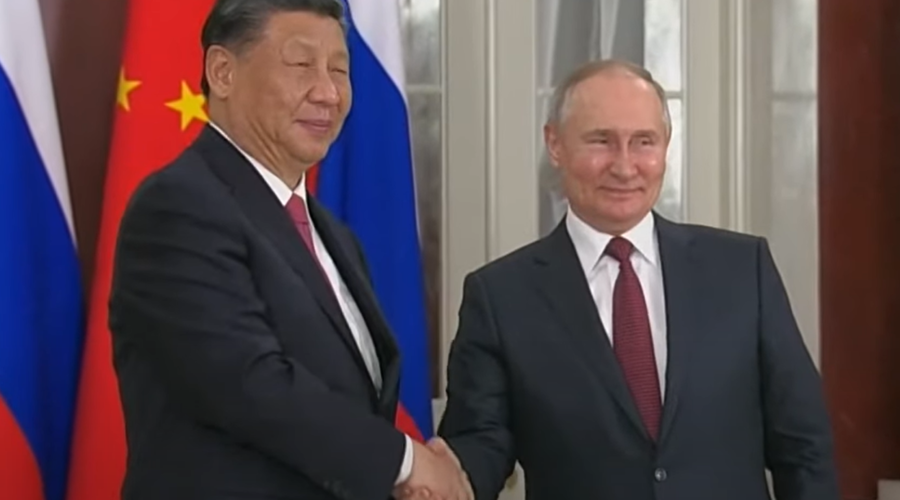In order to avoid, or at least postpone, what appears to be an inevitable defeat in Ukraine, Russia desperately needs China’s help. In the long-term, Moscow is unlikely to be able to continue fighting the war on its own against a country that is firmly backed by the entire Western civilization. But will Beijing really risk jeopardizing its relations with the West by assisting the Kremlin?
Even before China’s President Xi Jinping visited Moscow on March 20, it became obvious that the Chinese leader aims to portray himself as a “peacemaker”. A recent China’s brokering of the Iran-Saudi Arabia agreement on normalization of relations has clearly shown that Beijing has capacity to play the role of a mediator in the global arena. But in Ukraine, the United States and its European allies do not seem willing to allow Russia and China to freeze the conflict.
From the Western perspective, any potential ceasefire deal that the People’s Republic advocates would legitimize Russia’s gains in Ukraine. That is why the Western powers, under the current circumstances, firmly oppose any of Kyiv’s negotiations with Moscow. In the coming months, after Ukraine gets more tanks, jets and artillery ammunition, the Eastern European country is expected to launch a large-scale offensive against the Russian forces, which means that Kyiv will have a strategic initiative and will be in a position to dictate all the terms and conditions regarding potential negotiations.
But even then, despite defeats on the battlefield, the Russian leadership will be willing to negotiate. Moscow, unwilling to “fight until the end”, seems ready to sign any ceasefire, or even a peace deal that will allow the Russian leaders to save face. The problem for the Kremlin, however, is that nobody in the West will sign any agreements with the Russian President Vladimir Putin. After the International Criminal Court (ICC) in The Hague issued an arrest warrant for Putin over the alleged overseeing the abduction of Ukrainian children, in the eyes of the West the Russian leader has stopped being a legitimate partner for negotiations. He will now be treated as a suspected war criminal, despite the fact that the United States itself does not recognize the legitimacy of the International Criminal Court.
Putin will, therefore, seek to strengthen his relations with Xi, in order to show that he is not isolated, and that the ICC arrest warrant is nothing but a dead letter. But since there ain’t no such thing as a free lunch, Russia risks becoming China’s junior partner, even though there is no guarantee that Beijing will firmly support Moscow’s actions in Ukraine. Instead, for the time being, the People’s Republic will likely continue balancing its current ties with the West, with its cooperation with the Kremlin.
Given that China’s major trade partners are the United States and the European Union, at this point Beijing is unlikely to be ready to cross their red lines and start arming Russia. The People’s Republic will likely seek to strengthen economic ties with the Russian Federation, and help the Kremlin create an illusion that the ICC arrest warrant is “null and void”. Also, the fact that a Chinese humanitarian affairs official recently visited the Russian-controlled Donbass suggests that Beijing will continue pursuing its “pro-Russian neutrality” policy.
But does such an approach suit Russia?
Politically – yes, since everything about Vladimir Putin is a PR stunt, and all he needs right now is to present himself as a leader who is not isolated, and who is apparently not worried about the ICC arrest warrant. Militarily – no, given that Putin and his oligarchs have, over the past 20 years, deindustrialized the Russian economy (including the military-industrial complex) to such an extent that the country is forced to import weapons from Iran, since it cannot produce them on its own. The West will continue supplying Ukraine with weapons as long as it takes, while Russia – even if it manages to repel the Ukrainian offensive this spring and summer – will soon start facing a serious weapon shortage.
Therefore, if Beijing, be it publicly or secretly, does not start supplying Russia with drones, artillery ammunition, and various kinds of weapons, in the long-term the Russian forces in Ukraine could find themselves in a hopeless situation. As a result, Russia could suffer a defeat that will undoubtedly lead to a large-scale destabilization of the country, and potentially even to overthrow of Vladimir Putin. Would such an outcome suit China?
On the one hand, if Beijing’s strategic goal is to establish control over parts of energy-rich Siberia, then a potential breakup of the Russian Federation would be in China’s best interests. On the other hand, if the People’s Republic does not have such plans, then Russia’s defeat in Ukraine could represent a big threat for Beijing, especially if pro-Western and anti-Chinese forces come to power in a post-Putin Russia.
Therefore, sooner or later, one way or another, China will be forced to “choose a side” in the war between Russia and the Western-backed Ukraine.
Beijing’s position of a “pro-Russian neutrality” without concrete help for the Russian military, will almost certainly lead to Russia’s defeat in the Eastern European country. Such a Chinese approach will be interpreted as the People’s Republic’s tacit support for the West against Russia.
The ball is now in Chinea’s court.
Image: Sky News

